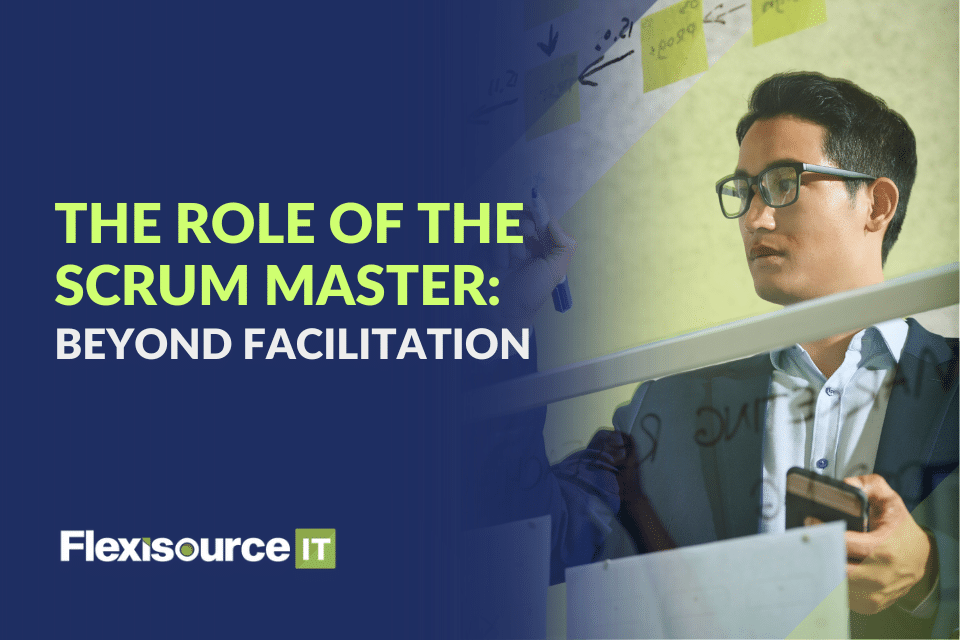The role of a Scrum Master is often seen as one of facilitation, but it goes far beyond that. While Scrum Masters do ensure smooth sprint cycles and coordinate Scrum ceremonies, they also play a vital role in team cohesion, process improvement, and agile growth.
This article explores the many responsibilities of a Scrum Master, the essential skills required for success, and how they differ from other project roles. Understanding these distinctions will help organisations fully realise the value that a skilled Scrum Master brings to agile projects.
What is a Scrum Master?
Before learning more about a Scrum Master, we should first understand “what scrum is?” Well, basically, Scrum is an agile project management framework primarily used in software development but adaptable to various fields. It focuses on iterative progress, collaboration, and flexibility to deliver high-value products quickly. Scrum breaks down complex projects into smaller, manageable tasks completed over short cycles called “sprints,” which usually last 2-4 weeks.
That said, the role of the scrum master in this is to facilitate this process. Their primary responsibility is to guide and support the Scrum Team and ensure adherence to the agile Principle. They organise and facilitates Scrum events, including sprint planning, daily stand-ups, sprint reviews, and retrospectives. These meetings help the team stay aligned and focused on the project goals.
Key Responsibilities of a Scrum Master Beyond Facilitation
The role of a Scrum Master goes beyond just managing or enforcing rules—it involves facilitating team success, coaching, and removing obstacles to help the team work more efficiently and effectively.

Coach and Mentor
First and foremost, a Scrum Master helps the team understand Scrum principles and promotes a shared understanding of agile practices. They also ensure that team members understand the purpose of each Scrum event, role, and artifact and how these elements contribute to agile success.
Aside from that, the role of the scrum master involves mentoring and supporting the teams’ growth. They lead retrospectives where the team reflects on what went well, what could improve, and actionable steps for future sprints, promoting a cycle of constant improvement. With this, they encourage the team to have a self-organising mindset and support continuous improvement.
Servant Leader
Acting as a servant leader, the Scrum Master puts the needs of the team first and foster an environment where team members can perform their best. They should build trust within the team and enable open communication and collaboration.
Furthermore, as a servant leader, they need to empower self-organisation. They need to trust the team to manage their work, allow them to make decisions, solve issues, and take ownership of their work.
Scrum masters should only provide guidance and avoid micromanaging the team to foster a sense of autonomy.
Impediment Remover
One of the core role of the Scrum Master is identifying and removing any obstacles or bottlenecks that could hinder the team’s progress. Impediments often arise from miscommunication or lack of clarity. The Scrum Master acts as a bridge between the team and stakeholders, ensuring that communication is clear and expectations are aligned.
On another note, sometimes, the team may lack the tools, software, or hardware necessary to complete their tasks. The Scrum Master works to ensure the team has access to the resources they need. They coordinate with other departments or advocate for budget adjustments.
Stakeholder Engagement and Management
One of the essential role of the Scrum Master of a Scrum Master is fostering clear and continuous communication between the Scrum team and stakeholders. This is to ensure alignment with broader project goals.
The Scrum Master acts as a bridge, facilitating two-way communication that keeps both parties well-informed and focused on the same objectives. They work to understand stakeholder expectations, priorities, and concerns, translating these into actionable insights that can guide the team’s work without disrupting the agile flow.
And incase where stakeholder requests might conflict with agile principles or the team’s workflow, the Scrum Master should tactfully advocates for the Scrum process, explaining the value of preserving team focus and maintaining sprint commitments.
Data-Driven Decision Making
Lastly, the Scrum Masters play a crucial role in helping teams leverage data to make informeddecisions that improve efficiency, productivity, and overall project outcomes. They guide the agile team in their performance by identifying areas for continuous improvement using metrics such as decisions that improve efficiency, productivity, and overall project outcomes.
Skills Essential for a Successful Scrum Master
With the above-mentioned responsibilities, A Scrum Master must have a unique blend of technical knowledge, leadership abilities, and interpersonal skills. As mentioned, their role goes beyond mere facilitation. They must foster a productive and collaborative environment while ensuring the Scrum framework is upheld.
With that said, here are some essential scrum master skills:
Deep Understanding of Agile and Scrum Principles
A successful Scrum Master must have a thorough knowledge of Scrum principles, practices, and agile methodologies. This foundation enables them to guide the team effectively, ensuring that they adhere to Scrum values and processes while adapting flexibly to specific project needs.
Coaching and Mentoring Skills
As mentioned, the role of the scrum master includes coaching and mentoring both the team and the organisation. While they do not directly manage the team, they guide and empower team members to embrace agile principles, collaborate effectively, and solve problems independently.
That said, scrum masters should have mentoring skills to encourage continuous improvement and self-organisation within the team. Ultimately guiding team members to become more effective and autonomous.
Conflict Resolution and Mediation
Conflicts can arise in any team setting, whether due to differences in working styles, misunderstandings, or competing priorities. A team often faces interpersonal or inter-departmental conflicts that can affect team productivity.
That said, effective Scrum Masters need strong conflict-resolution skills to address issues diplomatically and constructively. Having strong conflict resolution skills can help Scrum Masters resolve these issues constructively, preventing them from escalating and ensuring the team remains cohesive.
Facilitation and Organisational Skills
Facilitation and organisational skills are fundamental for the role of the scrum master. They facilitate core Scrum ceremonies such as sprint planning, daily stand-ups, sprint reviews, and retrospectives. The Scrum Master must run these sessions efficiently, keeping discussions focused while ensuring every team member has a voice and that the meeting outcomes are clear and actionable.
Thus, Scrum Masters must have exceptional organisation and communication skills. For example, in a retrospective, a Scrum Master with strong facilitation skills can encourage open, honest feedback while maintaining a constructive atmosphere.
Empathy and Emotional Intelligence
A Scrum Master with high emotional intelligence can connect with team members on a personal level, creating a foundation of trust. Empathy allows them to see things from the team’s perspective, which helps team members feel understood and supported. This trust fosters open communication and collaboration, which are essential for a high-functioning agile team.
Vision and Strategic Thinking
In agile environments, priorities can shift quickly. Scrum Masters who think strategically can help the team adapt without losing focus, guiding them in prioritising work that delivers the most value.
This ensures that the team consistently works on tasks that support the overall strategy, reducing wasted effort on low-impact activities.
Scrum Masters vs. Other Similar Roles
The role of the scrum master is often compared with other project-related roles, such as Project Managers, Product Owners, and Agile Coaches. While these roles may share some overlapping responsibilities, each has a distinct focus within agile project management.
Likewise, here’s a breakdown of how Scrum Masters differ from these other similar roles:
Scrum Master vs. Project Manager
Scrum Masters focus on guiding the team to follow Scrum principles, creating a productive work environment, and ensuring smooth sprint cycles. They do not manage timelines, budgets, or team assignments in the traditional sense.
On the other hand, Project Managers have a broader scope that typically includes planning, budgeting, and overseeing projects from start to finish. They are responsible for managing resources, timelines, and overall project delivery.
While Project Managers oversee the “big picture” and the end-to-end execution of projects, Scrum Masters work within a more defined scope, focusing on facilitating the team and removing obstacles to enable agile success. Scrum Masters emphasise team empowerment and self-organisation, while Project Managers often direct team activities.
Scrum Master vs. Product Owner
The Scrum Master ensures the team adheres to Scrum practices. They facilitates the team’s work and supports them in meeting sprint goals without getting involved in backlog prioritisation.
In contrast, the Product Owner focuses on defining and prioritising the product backlog, maximising the product’s value from a business perspective. They are responsible for managing the backlog, prioritising user stories, and clarifying requirements. They work closely with stakeholders to ensure the team builds the most valuable features.
The key difference between the two is that the Product Owner represents the customer’s voice and business needs, whereas the Scrum Master serves as a coach and facilitator for the team, focusing on process rather than product features.
Scrum Master vs. Agile Coach
Scrum Masters operate at the team level, supporting a specific Scrum team. They focus ONLY on supporting their specific team by removing obstacles, guiding through the Scrum framework, and ensuring sprint goals are met.
Agile coaches work at an organisational level. They promote agile transformation across multiple teams or departments, train teams in agile principles, and often mentor Scrum Masters. They may introduce other agile methodologies (e.g., Kanban, Lean) and work to embed a broader agile mindset within the organisation.
Scrum Master vs. Team Lead
A Team Lead, especially in technical teams, often has more responsibility for guiding specific task assignments, reviewing work, and providing technical direction. They are typically involved in providing technical mentorship and often have some level of authority over team members’ work, assigning tasks, or making technical decisions.
Scrum Masters, on the other hand, do not assign tasks; they empower the team to self-organise and decide how to complete sprint goals. They focus on agile practices and team empowerment rather than on direct oversight of the team’s day-to-day tasks.
Scrum Master vs. Development Manager
Development Managers often have a role in hiring, performance reviews, and career development for team members, which are not part of a Scrum Master’s responsibilities. They manage team composition, handle performance management, and may be responsible for the technical growth of the team.
Meanwhile, Scrum Masters focus on facilitating the agile process, supporting team communication, and ensuring Scrum practices are followed without management authority over team members.
Conclusion
At the end of the day, a Scrum Master does so much more than just keeping meetings on track. They are the heart of the team’s agile journey – ensuring that agile principles are adhered to. They alsand fostering an environment where continuous improvement, collaboration, and high performance are the norm.
If your organisation needs to get more from Scrum and foster a truly agile mindset, our expert Scrum Masters at Flexisource IT is ready to support you. Contact Flexisource IT here to get started on your agile journey!





